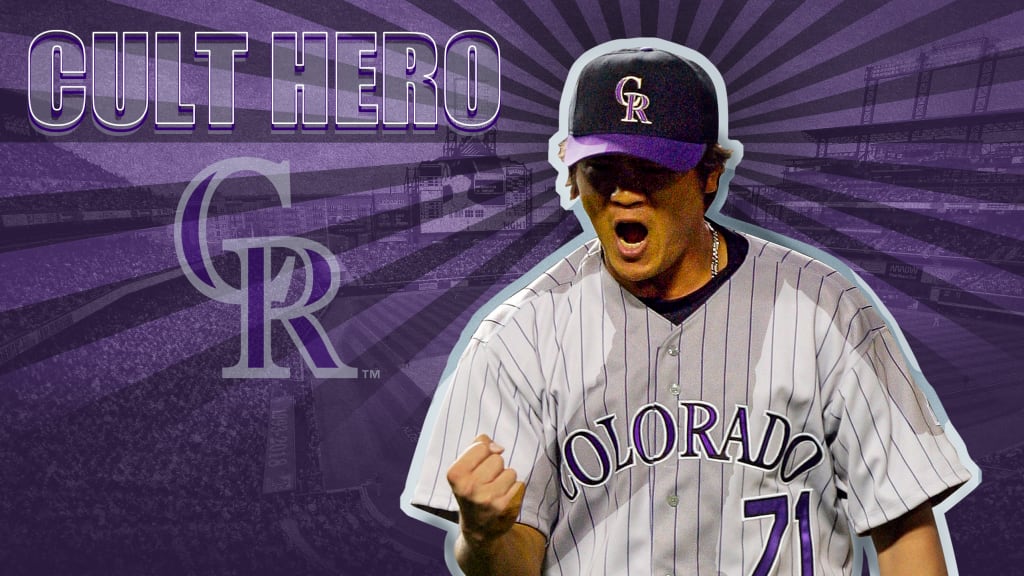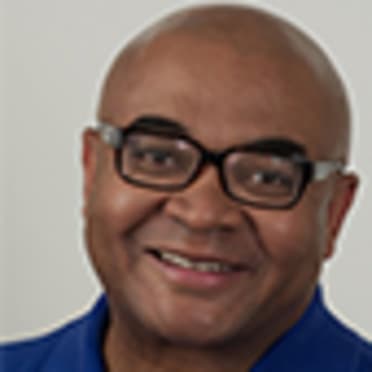
DENVER -- The Rockies thought putting then-18-year-old Chin-hui Tsao against big leaguers, even for an inning in a Spring Training game on March 18, 2000, was too much, too soon.
But Tim Ireland, then working as the organization’s Pacific Rim scouting coordinator, knew that Tsao’s appearance would whet Major League appetites.
The outing against the Mariners at Peoria, Ariz., was short. But two strikeouts and three helpless batters later, the Rockies were eager to see more.
“He made guys look like clowns and whoa, he lit up the whole stadium -- it was abuzz,” Ireland recalled, with nearly 20 years of excitement still in his voice.
Only injuries could slow Tsao in the Minors, but not for long. He brought the same excitement in his Major League debut on July 25, 2003, as the first Taiwanese pitcher to appear in the Majors. By 2005, his fastball was hitting 100 mph.
But he would miss 2006 after right shoulder surgery, and he would be released after 29 games in Purple Pinstripes that year. Oddly, the signing of Tsao indirectly led to one of the developments that helped the Rockies make the 2007 World Series. Then again, a lot of things were odd about Tsao’s career.
Tsao would make 21 appearances for the Dodgers in 2007. He returned to Taiwan, saw his career halted in a gambling scandal, then returned to the Majors in 2015 and appeared in seven games over two more seasons with Los Angeles.
Still, Tsao is memorable in Rockies lore for his strange signing and electric work during the rare times he was healthy. He posted a 4-3 record and a 5.80 ERA with four saves in three seasons with Colorado, striking out 44 in 63 2/3 innings (eight starts, 21 relief appearances).
“There are guys you think about,” said Clint Hurdle, the Rockies’ manager when Tsao made his Major League debut. “You kind of think, ‘How would that have played out? How could that have been incorporated?’”
To think, Ireland had no idea he would catch lightning on his radar gun during the 1999 Asia Cup, which qualified Taiwan (known in Olympic circles as Chinese Taipei) for the 2000 Olympics. Ireland had managed Taipei Gida to the 1998 Taiwan Major League championship. He also doubled as a Rockies scouting employee.
His work with the Rockies allowed him to go to Japan for the Asia Cup -- an event that was chock-full of Taiwanese pitching talent.
“The first guy that came along was Chien-Ming Wang, who [went on to pitch for] the Yankees,” Ireland said. “I remember mentioning to one of the scouts that was there, ‘We’re not going to see anything like this after this in the tournament.’
“Then, lo and behold, here comes Hung-Chih Kuo, who was the All-Star lefty for the Dodgers all those years. He pitched next. And this guy’s stuff was better than Wang’s. And we’re going, ‘Whoa.’ This is not the type of thing you see every day scouting in the Netherlands. Let’s put it that way.”
Good thing Ireland kept watching.
“Then, after Kuo comes Tsao and it was, I mean, it was like a bomb going off when he threw his fastball and the catcher caught it,” Ireland said. “It was like, ‘Whoa, this guy’s got better stuff than Kuo.’ And they’re all, like, awesome.”
But signing Tsao and getting out of the country with him took some maneuvering.
The Dodgers had previously signed outfielder Chin-Feng Chen, who would become the first Taiwanese player to appear in the Majors. The problem was that it was the early days of signings from the Pacific Rim, and the Taiwanese government and baseball federation officials didn’t want the signing to occur. Teams were fearful.
But Ireland had an inside track.
The team Ireland managed had a good working relationship with Tsao’s representatives. The Rockies also had help from Ming Harber, a Greeley, Colo., resident who had worked under Rockies ownership in another business. He provided valuable translation with Tsao’s family. As part of the agreement, Tsao would quietly pitch a few games in the Taiwanese professional league, then make a smooth trip to America with a $2.2 million bonus.
The Rockies knew little of Tsao beyond buzz from the tournament and Ireland’s reports. Jeff Schugel, then working in scouting for the Rockies, made a trip, but a tired Tsao was not reaching 90 mph on his fastball.
After the 1999 season, Dan O’Dowd replaced Bob Gebhard as Rockies general manager, and Schugel took a job with the Dodgers, leaving Ireland as the lone eyewitness.
That would change by Spring Training. Ireland informed O’Dowd and then-manager Buddy Bell that part of the agreement called for Tsao to pitch in a Spring Training game, which would be televised in his home country.
“I wasn’t crazy about throwing him in a Spring Training game,” recalled O’Dowd, now an analyst at MLB Network. “I thought that was putting way too much pressure on him right out the gate.
“He had some delivery issues, but he had exceptionally good arm speed, well-above-average slider. He needed a ton more work on his fastball command, just his ability to understand how to utilize his stuff in context of his delivery.”
Tsao lit it up in his spring debut, and struck out 187 in 145 innings at Class A Asheville that year. He made four starts at Class A Advanced Salem in 2001 before undergoing reconstructive right elbow surgery. He would make 12 starts over the final two months of 2002, with 61 strikeouts in 58 1/3 innings.
He was moving fast. Too fast, it turned out.
In those days, teams weren’t set up with full-time interpreters. O’Dowd credited Harber for bridging the language barrier, and the club had a program that integrated prospects into the Denver community. But on the mound, language was a barrier to his coaching. And he had immense mileage before he ever signed.
“I did have some concerns because he had some very, very high usage patterns at a very young age,” O’Dowd said. “That was a really red flag for me. And that [slider] is a high-stress pitch, from a delivery that was a work in progress from a guy who was just filling out physically. I was excited about it, but also extremely cautious.”
The Rockies assigned Tsao to Double-A Tulsa in 2003. In his first start, he dominated against the Rangers’ Frisco affiliate -- managed by Ireland. In just 18 starts, he threw 113 1/3 innings and struck out 125. It turned out he had enough innings to win the Texas League ERA title, but he wasn’t there to enjoy it, as he earned his promotion to the Major Leagues.
Tsao appeared in nine games and made eight starts for the Rockies in the final months of the 2003 season.
With his fastball and slider -- but no third pitch -- the Rockies believed a new plan would work.
“We thought so much of Chin-hui that our plan was to turn him into the closer -- pitch one inning, let the fastball eat and spin the ball,” Hurdle said. “It was a slider similar to the one that Patrick Corbin is throwing from the left side. Chin-hui’s had depth and it had tilt and it had bottom to it.
“When he threw it, the fastball played. It was probably 93, 94 mph, but it looked like 100. The combination of two pitches -- they call it tunneling now. The one would come out of his hand and carry through the zone, the fastball, and his slider actually disappeared. It was just a disappearing slider.”
After missing much of 2007 with the Dodgers because of injury, Tsao pitched at Triple-A Omaha with the Royals in 2008 before being released. He then joined the Brother Elephants in the Chinese Professional Baseball Association. After 2009, he was ruled ineligible for, according to authorities, accepting improper benefits from the mafia in return for attempting to fix two games, though the fixes never actually occurred.
Leagues in multiple countries refused to clear Tsao until December 2014. He began the season, ironically, at Tulsa until being promoted to the Majors in July. He would go 1-2 with a 9.35 ERA in seven games with the Dodgers in 2015-16. He finally retired after a stint in the independent Atlantic League in 2017.
Before the injuries and strange allegations, Tsao left a positive impression on the Rockies.
Hurdle said Tsao had “a very unique sense of humor” and “didn’t take things for granted.”
O’Dowd called Tsao “a mentally tough kid. … You don’t go through what he went through without being mentally strong. No. 2, he was an exceptionally good athlete, and a highly competitive young man. So he had a really good set of intangibles working for him.”
Ireland said signing Tsao was not a tough decision.
“When a guy is throwing 97 with an unbelievable slider and a good curveball, any idiot could’ve seen that he had good stuff,” Ireland said.
Interestingly, the signing of Tsao, who did not respond to an email request asking for comment for this story, indirectly led to a key development in the 2007 season.
While scouting Tsao, Ireland went into a convenience store in Japan and saw a skinny Panamanian pitcher who was participating in a tournament there. Ireland signed Manny Corpas, who became the closer on the team that went to the World Series. Imagine that team also having a healthy Tsao.
“Corpas had a really good slider and sinker, and he made a nice little career out of it -- but Chin-hui’s overall stuff was probably better,” Hurdle said. “He just never had the opportunity to get it out there consistently.”
